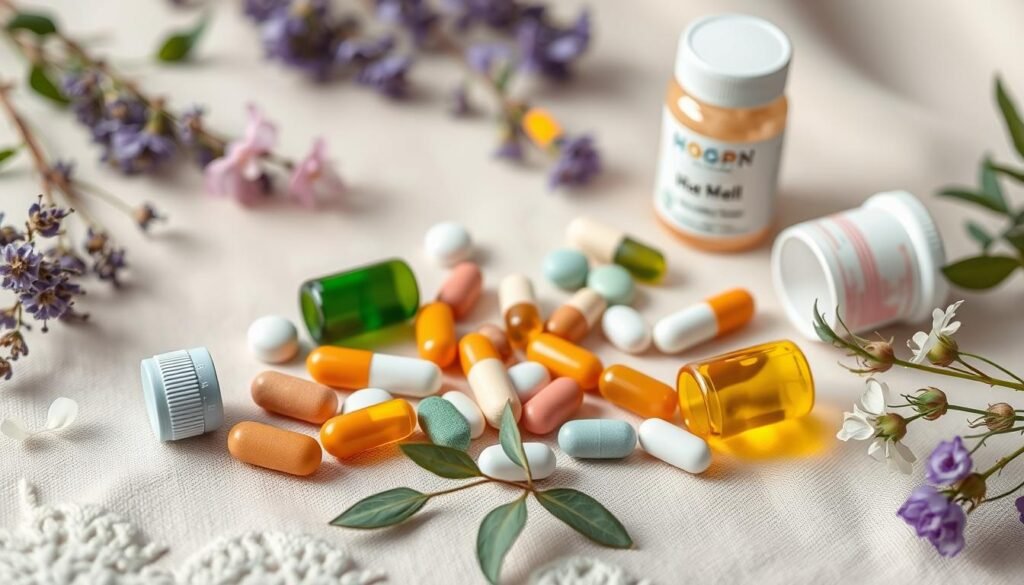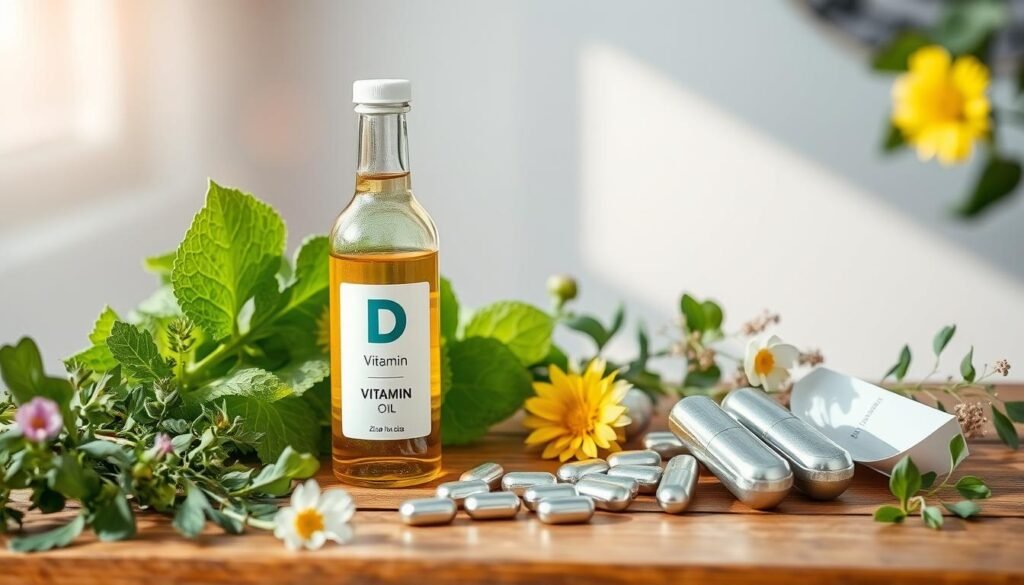About 17 million adults in the United States face depression annually. Yet, nearly 60% do not get medical help. This fact has sparked an interest in alternative treatments, like supplements. Are they a good choice alongside traditional methods?
Many think supplements can boost mood and improve mental health. St. John’s Wort, SAMe, and omega-3s seem promising. But, their success needs more study.
Remember, these supplements aren’t always approved by the FDA. They might not mix well with your medicines. So, talking to a doctor before starting them is wise.
Key Takeaways
- 17 million adults in the U.S. face depression each year.
- 60% of individuals with depression do not seek medical assistance.
- St. John’s Wort may aid mild or moderate depression but can have interactions.
- SAMe requires caution due to possible side effects at higher doses.
- Omega-3 fatty acids are being studied for their role in mood improvement.
- Consulting a healthcare provider is important before starting any supplements.
Understanding Depression
Depression is a common mental health issue that deeply affects people’s daily lives. It brings more than just ongoing sadness. It can also make normal work and personal activities hard. In this section, we talk about the symptoms of depression. These symptoms are different for everyone but often include feeling hopeless and losing interest in fun activities.
What is Depression?
Depression is a strong feeling of sadness and lack of interest. It’s a serious issue. Major depressive disorder (MDD) is very widespread. It can come from genes, stress, and brain biology. Knowing what depression is helps us find good ways to help those suffering.
Symptoms of Depression
The symptoms of depression show up in many ways. Some common signs are:
- Persistent sadness or feeling empty.
- Not enjoying things like before.
- Changing a lot in weight.
- Having trouble sleeping or sleeping too much.
- Thinking about suicide or acting on those thoughts.
Spotting these signs early is key to helping someone get better and enjoying life again.
Prevalence of Depression in the U.S.
Depression affects many people in the U.S. Back in 2020, about 1 in 10 Americans felt depressed. Young adults, especially those 18 to 25, saw a depression rate of 8.7%. Women, ethnic minorities, and older adults often struggle more with depression. These numbers show how important it is to be aware and offer support.
| Age Group | Prevalence of Depression (%) |
|---|---|
| 18–25 years | 8.7 |
| Overall U.S. population (2020) | ~10 |
| Adults over 60 years | Higher risk compared to younger demographics |
Traditional Treatments for Depression
Depression can be tackled through various traditional treatments. These include medications and psychological therapies. Knowing how they work and their side effects is crucial for making good choices for your mental health.
Medications for Depression
Selective serotonin reuptake inhibitors (SSRIs) are a top choice for treating depression. They work well and usually have fewer side effects. Some well-known SSRIs are citalopram (Celexa), escitalopram (Lexapro), fluoxetine (Prozac), paroxetine (Paxil, Pexeva), sertraline (Zoloft), and vilazodone (Viibryd). There are also serotonin-norepinephrine reuptake inhibitors (SNRIs) like duloxetine (Cymbalta), venlafaxine (Effexor XR), and desvenlafaxine (Pristiq).
Tricyclic antidepressants and monoamine oxidase inhibitors (MAOIs) are other options. They can work well but might cause more side effects. Medicines such as imipramine (Tofranil) and phenelzine (Nardil) fall into this category. People should talk to doctors to find the best treatment. It’s important especially during pregnancy or breastfeeding.
Psychological Therapies for Depression
Psychological therapies are also vital alongside medications. Cognitive behavioral therapy (CBT) is well-regarded for its effectiveness. It helps identify and change negative thoughts and behaviors. Interpersonal therapy and group therapy can also be beneficial. They provide a supportive space to share feelings and experiences.
A combination of medication and therapy often yields the best results. For those seeking alternative options, visit this resource for more information.

| Treatment Type | Examples | Main Benefits |
|---|---|---|
| SSRIs | Citalopram, Escitalopram, Fluoxetine | Mild side effects, effective for moderate depression |
| SNRIs | Duloxetine, Venlafaxine | Helpful in managing pain and depression |
| Psychological Therapies | CBT, Interpersonal Therapy, Group Therapy | Supportive environment, fosters understanding |
| Tricyclics | Imipramine, Amitriptyline | Effective for severe depression, but more side effects |
| MAOIs | Phenelzine, Tranylcypromine | Helpful for atypical depression cases |
Supplements for Depression: Do They Really Work?
Research on supplements for depression shows it’s complicated. Some may help, but it depends on the person. Knowing this difference is key for those looking at alternatives to standard treatments.
Overview of Current Research
Some research points to specific supplements aiding in depression relief. A 2019 study mentioned vitamin D’s potential for those severely depressed. Also, B vitamins like folate, B12, and B6 could be important. Their lack might increase depression risks.
Taking these vitamins could enhance mood and lessen depression. Magnesium has also emerged as beneficial against depression. People lacking magnesium might see improvement with supplements. This mineral helps manage stress better. Additionally, low zinc levels are found in depressed individuals. Taking zinc could act as an antidepressant.
Other supplements like St. John’s wort and omega-3 fatty acids have been explored. They show promise in easing depression symptoms. These cases underline the need for detailed research on supplement impacts.
Importance of Consulting Healthcare Providers
Always talk to healthcare providers before trying supplements. Tailored treatment plans are crucial for safety and results. They help especially if you lack nutrients, face mild symptoms, or have medication issues. Supplements might boost standard therapy but should not replace it, experts warn.
Thorough research on supplements for depression and doctor collaboration is essential. It ensures a well-rounded depression treatment approach.
Commonly Used Supplements for Depression
Many people look for natural ways to fight depression along with traditional methods. Some supplements can help improve mood and lessen depression symptoms. Let’s look closely at St. John’s Wort, SAM-e, and Omega-3 Fatty Acids, to understand their benefits and risks.
St. John’s Wort: Efficacy and Cautions
St. John’s Wort is known for its potential in treating mild to moderate depression. Research shows it might help just as much as standard antidepressants. However, it can affect how other medications work. Talking to a healthcare provider before starting St. John’s Wort is essential.
SAM-e: Potential Benefits and Risks
SAM-e, a compound our bodies make, has been studied for mood improvement. It might relieve depression symptoms and boost emotional wellness. But, being a synthetic product, it can have side effects and interactions. Before using SAM-e, it’s wise to consult with a healthcare expert.
Omega-3 Fatty Acids: Brain Health and Mood
Research on Omega-3 Fatty Acids, especially from fish oil, focuses on brain health and mood. High levels of EPA, a specific Omega-3, may lower depression symptoms. As many Americans don’t get enough Omega-3s, adding supplements like fish oil could be helpful. It’s important to talk to healthcare providers about using Omega-3 safely and effectively.
| Supplement | Efficacy | Considerations |
|---|---|---|
| St. John’s Wort | Effective for mild to moderate depression | May interact with medications |
| SAM-e | Potential mood enhancer | Possible side effects; discuss with doctor |
| Omega-3 Fatty Acids | Supports brain health and mood | Consult healthcare professional for guidance |
Together with professional advice, these natural remedies can form a powerful treatment plan for depression. For more details on managing different types of depression, visit this resource.
Vitamins and Minerals Linked to Mood Regulation
Vitamins and minerals are crucial for mood regulation and mental health. Vitamin D, folate, and zinc are especially important. Having low levels of these can lead to depression and issues with thinking. It’s vital to understand how they contribute to mental health management.
Vitamin D: The Sunshine Vitamin’s Role in Mental Health
Vitamin D helps make neurotransmitters and influences our mood and mental well-being. Studies have found a link between low vitamin D and mood disorders. Older adults with depression often have lower levels of vitamin D. It’s recommended to get enough vitamin D from the sun and food for good mental health.
Folate: Importance for Neurotransmitter Production
Folate, or Vitamin B9, is essential for making neurotransmitters that affect mood. Not having enough folate can increase depression risk. Folic acid, with antidepressants, could offer more relief for women. An intake of about 1 milligram of folic acid daily is suggested for mental health.
Zinc: Connection Between Deficiency and Depression
Zinc is vital for mental health. A lack of zinc can change behavior and make depression more likely. Taking zinc supplements can help antidepressants work better. Eating a diet rich in zinc is important, as many don’t get enough from food alone.

Nutrition plays a key role in fighting depression. Eating well and possibly taking supplements can help with mood and mental health. For more on nutrition and depression treatments, check out this comprehensive guide.
The Role of Probiotics in Mental Health
Probiotics in mental health is an exciting, new area. It shows how they might help with depression and anxiety through the gut-brain link. This connection shows the way our gut health can impact our feelings and how we think. It suggests a deep link between our stomach health and our mental state.
Understanding the Gut-Brain Connection
The gut-brain connection is about how our stomach and brain communicate. It’s found that our gut, which has around 100 trillion microbes, is key in controlling our mood and mental health. Certain probiotics are known to boost mood. They may also help reduce anxiety and depression by affecting our brain chemicals and lowering inflammation.
Research Supporting Probiotics for Depression
Recent research highlights probiotics’ role in lessening depression symptoms. Clinical trials show that probiotics and prebiotics can improve mental health. This research found significant progress in people with mild to moderate depression. A meta-analysis showed those treated with these supplements fared better than those who received a placebo.
While not all studies found probiotics to massively change mood for everyone, they still have a big, positive effect for certain groups. This is especially true for people with lower incomes, where getting probiotics and fermented foods might be hard.

Herbal Remedies: More Than Just Supplements?
Herbal remedies are becoming popular as either add-ons or alternatives to usual depression treatments. This part talks about two important herbs: Rhodiola Rosea and 5-HTP. They could be key in making people feel better and less stressed.
Rhodiola Rosea: Stress Reduction and Mood Enhancement
Rhodiola Rosea is celebrated for its ability to help the body deal with stress. Studies show that this herb might uplift spirits and fight off depression, especially if you’re often tired or under a lot of stress. It’s also good at giving a much-needed energy boost to those fighting depression.
5-HTP: Serotonin Production and Mood Improvement
5-HTP comes from the seeds of the African plant Griffonia simplicifolia. It’s thought to help make more serotonin in the brain. Having more serotonin is linked with feeling happier and more at ease. Although tests on animals are promising, we still need more studies on humans to fully understand its benefits and risks.
| Herbal Remedy | Potential Benefits | Considerations |
|---|---|---|
| Rhodiola Rosea | May help reduce stress and enhance mood | Individual responses can vary; consulting a healthcare provider is recommended |
| 5-HTP | May improve serotonin levels and support mood | Limited human studies; safety profile requires further research |
Safety Concerns When Using Supplements
Taking dietary supplements has become common for those wanting to beat depression. Many think these supplements are safe because they come from nature. But there are big safety concerns to think about, especially if you’re also taking prescription drugs. Knowing about these issues is key to making smart choices.
Potential Interactions with Prescription Medications
Dietary supplements can cause risky interactions with medications. This might hurt your health. For example, St. John’s Wort can mess with many drugs, such as antidepressants and birth control pills. These issues can make your medicine work poorly or increase side effects. Always talk with your doctor about the supplements you’re thinking of taking.
Quality and Regulation of Supplements
The quality and regulation of dietary supplements is a big worry. They aren’t checked by the FDA like drugs are, leading to problems. For instance, labels might be wrong or ingredients could be harmful. A report from 2019 found out that nearly 70,000 people called poison control because of supplements. Some of these cases were very serious. It shows why picking supplements from trusted places is crucial for your safety and health.
Combining Supplements with Traditional Treatments
Using supplements with traditional treatments can make depression care more complete. Studies have found that certain dietary supplements, like SAMe and L-methylfolate, can improve the effects of antidepressants. For instance, SAMe has been shown in over 40 studies to help with depressive symptoms. Also, L-methylfolate helps a lot when used with regular medicine. This way of combining treatments takes care of mental health more fully, looking at both mind and body factors.
Complementary Strategies for Depression Management
A mix of supplements and traditional treatments can better fight depression. Adding nutrients such as vitamin D may help. Research shows it can lower inflammation and lift mood. Probiotics are also promising for mental health, with lots of studies showing their benefits in treatment plans. This approach, which includes diet changes and wise use of supplements, gives people more control over their symptoms.
Consulting with Healthcare Professionals
Talking to healthcare pros before trying new treatments is key. They offer custom advice to make sure supplements work well with other treatments. They also watch for any drug interactions and side effects, helping you get the most from your treatment. The aim is to find a treatment mix that provides stable mental health benefits. For more info on supplements and depression, see this detailed article here.